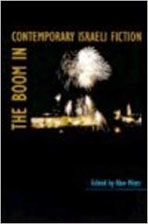The Boom in Contemporary Israeli Fiction

Alan Mintz, editor
A critical introduction to contemporary Israeli literature that places works and writers in their cultural and social context. Five essays explore facets of what Mintz calls the complexity of cultural reverberations in Israeli fiction of the past two decades, a period during which "literature and the institutions of literary culture became the principal mode of encountering and mediating modernity." Among the major concerns addressed are the emergence of female writers, characterization of redefined gender roles, re-imagining the Holocaust, de-marginalization of Sephardic writing, and adoption of innovative techniques like magic realism and experimental narrative strategies. The collection shows how contemporary Israeli literature both chronicles and confronts cultural and societal dichotomies -- collectivism vs. individualism, native Israelis vs. Holocaust survivors, male vs. female, religion vs. secular, Ashkenazic vs. Sephardic -- that characterize a nation whose self-conception has been shaped by its complex and conflicted history.
“This excellent collection examines a cultural phenomenon noted by many readers of international literature: contemporary Israeli fiction has achieved a recognition never gained by earlier modernist Hebrew authors; and the thematic and stylistic characteristics of the new writing are far more inclusive than the work of previous generations.
“In his clear, instructive introduction, Mintz summarizes the history of modern Hebrew fiction, charting its evolution from a male-dominated mode… to present-day ideological heterogeneity… [Contains] five rich, thoughtful essays, written by leading critical authorities Robert Alter, Anne Golomb Hoffman, Yael S. Feldman, Nancy E. Berg and Gilead Morahg.” — Choice
About the Editor
Alan Mintz is Joseph H. and Belle R. Braun Professor of Modern Hebrew Literature at Brandeis University. His books include Banished from Their Father's Table (1989).